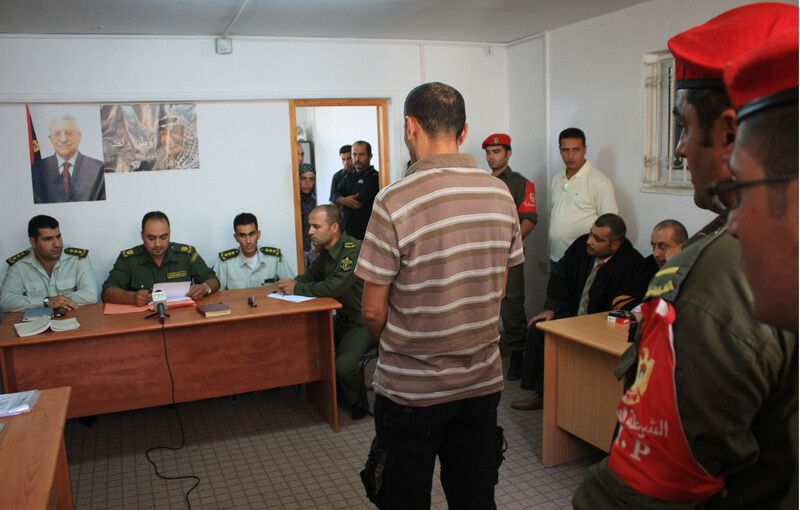The Electronic Intifada Ramallah 23 August 2011

Palestinian death row prisoners in PA military courts oftentimes don’t have opportunities to defend themselves.
MaanImagesRAMALLAH (IPS) - The execution of a Palestinian father and son by Hamas security forces in Gaza recently illustrates the sharp difference over the death penalty between Gaza and the West Bank. In the West Bank a temporary moratorium is in place.
The executions in Gaza were carried out despite pressure from Palestinian and international human rights organizations for the death penalty to be abolished.
“Although few of the West Bank sentences are carried out as Palestinian Authority (PA) President Mahmoud Abbas doesn’t sign the orders, the judicial system and sentencing procedures haven’t improved. We continue to struggle with other human rights groups to get the PA to change its laws,” Jaber Wishah from the Palestinian Center for Human Rights (PCHR) said.
The two were executed in July following their conviction on charges of treason and murder.
The man, aged 60, and his 29-year-old son had been sentenced to death by a civilian court in November 2004. An appeal against the sentence failed.
Hamas officials said the men had confessed to providing Israeli forces with intelligence which helped them track down Palestinian resistance fighters including Hamas leader Aziz Rantisi who was killed in a 2004 Israeli air strike on his car.
The Palestinian Center for Human Rights (PCHR) condemned the death sentences, saying they had been carried out without authorization from Abbas.
Correct procedures not followed
Under PA law, death sentences have to be ratified by the president under the 2001 Code of Criminal Procedures. The leader has withheld approval in recent cases, creating a de facto moratorium on capital punishment in the Israeli-occupied West Bank, where his administration still holds sway.
A political schism between Gaza’s Hamas leaders and the Fatah-affiliated PA in the West Bank following the 2007 civil war has split the Palestinian legal system, with the Hamas judiciary working independently of the judiciary in the West Bank.
The Palestinian Penal Code applying in the West Bank enables imposition of the death penalty for 17 offenses. In the Gaza Strip, the death penalty can be handed down in cases involving 15 offenses. The penal laws are normally implemented by ordinary civil courts.
PLO code allows death penalty
In addition to the current penal code, the PA also imposes the death penalty pursuant to the Palestine Liberation Organization’s Revolutionary Penal Code of 1979.
This code enables imposition of the death penalty for 42 offenses and is applied by special military and state security courts. These special courts are responsible for the vast majority of death sentences imposed by the PA.
This situation has been criticized by civil judges from the PA’s Judicial Authority.
Thuraya Alwazir, one of the PA Judicial Authority’s few female judges, expressed dissatisfaction with the military courts taking over the jurisdiction of civilian courts.
“We are not happy about this and believe that only civilian courts should have the authority to impose the death penalty. The president is aware of our concerns and the matter was being looked into. However, due to the current political situation the legislation has remained on hold,” Thuraya said.
International law flouted
According to Israeli rights group B’Tselem, the imposition of the death penalty in the Palestinian judicial system contravenes international law in several ways.
These include the broad number of offenses for which the penalty can be applied and the way these special courts deny defendants elementary rules of due process. The accused are given little opportunity to defend themselves and there is no judicial procedure to appeal the decisions of military and state security courts.
So far this year five Gazans have been executed by the Hamas authorities.
B’Tselem says that between 1995 and 2010, 89 Palestinians were sentenced to death. Eighteen executions were carried out over that period.
Two of the death sentences were commuted to prison sentences. Eight of the condemned were murdered while in PA custody. A further three were murdered after escaping from prison during Israel’s military assault on Gaza, Operation Cast Lead, in late 2008 and early 2009.
Eleven people were released from prison or managed to escape, while two people sentenced to death are missing. The rest remain on death row.
Haider Ghanem from Rafah in the southern Gaza Strip was on death row in Gaza’s central prison for a number of years. He was accused of providing Israel with information that led to the death of a number of Palestinian resistance fighters.
He managed to escape during Cast Lead. But masked Hamas gunmen abducted him from his sister’s home during the second night of his freedom.
“A group of heavily armed Hamas men forced their way into our home and took Haider away,” his sister Ighlas Ghanem said. “Several days later we were informed were we could retrieve his body. He had been severely beaten and had been shot numerous times in his legs and arms before being executed.”
All rights reserved, IPS - Inter Press Service (2011). Total or partial publication, retransmission or sale forbidden.





